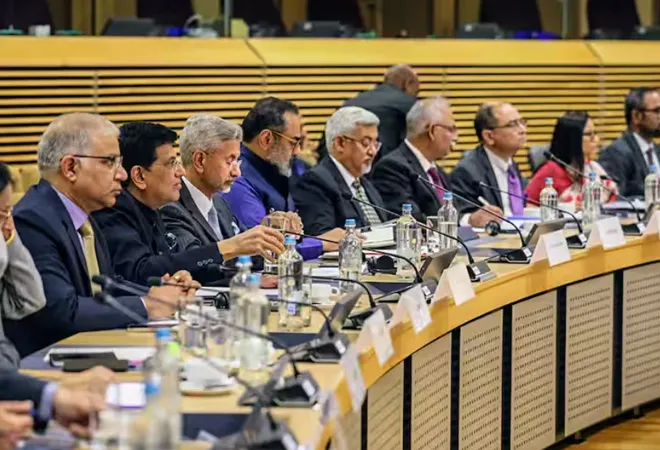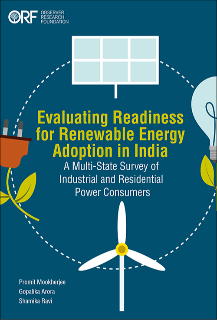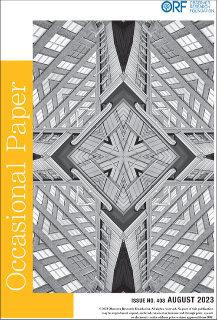
India and the European Union held their first Trade and Technology Council (TTC) meeting on 16 May 2023. The decision to establish a trade and technology council was announced by Prime Minster Modi and European Commission President Ursula von der Leyen in April 2022. The TTC was launched in February 2023 to
“tackle challenges at the nexus of trade, trusted technology, and security” and further strengthen India-EU strategic partnership. This TTC is the first of its kind for India and the second for the European Union (EU), as the EU’s first was launched with the United States (US) in 2021.
For the EU, its TTC with India is part of a series of digital partnerships that it has signed with Asian countries, including Japan (May 2022), Singapore (February 2023), and South Korea (November 2022), to address issues related to the digital divide and to strengthen “
a fair, inclusive and equal digital environment for all”. These partnerships also form part of its idea of working with l
ike-minded partners to promote a “positive and human-centric vision of the digital economy and society” as is envisioned in its 2030 Digital Compass.
India and the US also launched an initiative on Critical and Emerging Technology (iCET) in May 2022 to expand the strategic technology partnership and defence industrial cooperation between the two countries.
India, for its part, has been actively participating in various platforms and initiatives, which are aimed at strategic recalibration of trade and technology. These include the Quad
working group on emerging and critical technology, whose goal is to foster collaboration on setting standards and frameworks for emerging technology, including 5G/6G networks, AI, digitalisation, quantum computing, etc. Along with Japan and Australia, India
launched the Supply Chain Resilience initiative in 2021 to share best practices and promote inclusive growth. India and the US also
launched an initiative on Critical and Emerging Technology (iCET) in May 2022 to expand the strategic technology partnership and defence industrial cooperation between the two countries.
Given these developments, the IndiaEU TTC is a welcome step in furthering their strategic conversations. The India–EU TTC comprises
three working groups—the first on strategic technologies, digital governance, and digital connectivity, which will focus on areas such as quantum computing, AI, semi-conductors, etc.; the second on green and clean energy technologies with a focus on the circular economy, green transition, waste management, etc.; and the third on trade, investment, and resilient value chains, which focus on the resilience of supply chains, and the identification and resolution of trade barriers. The first meeting laid out a blueprint to operationalise these working groups. The following are the
key outcomes of the meeting:
Outcomes of the TTC meet
Working group 1
Under working group one, three key initiatives have been taken
. First is coordination within Global Partnership on Artificial Intelligence (GPAI), a multi-stakeholder initiative to
bridge the gap between “theory and practice on AI through research and applied activities.” It was announced on the margins of the G7 Summit of 2018 and was officially launched in 2020 with both India and the EU as founding members. Also, India assumed the Chair of GPAI in November 2022, focusing
on working with the members to “put in place a framework around which the power of Artificial Intelligence can be exploited...and ensure that there are adequate guardrails to prevent misuse and user harm.” This enhanced coordination comes against the background of the EU Parliament
endorsing the EU’s Artificial Intelligence Act on 11 May 2023, paving the way for the act to become law. Similarly, India has also put in place the
National Programme on AI (March 2022) and a draft
National Data Governance Framework Policy (July 2022) to establish an innovative ecosystem for AI. Collaboration on AI is also part of the India-EU
Roadmap to 2025 signed in 2020. This coordination under the TTC is expected to further cooperation on regulatory and innovative aspects of AI.
The TTC will work towards increasing interoperability between India and the EU’s DPIs and promote credible solutions for developing countries.
Second, the TTC recognised the need for India and the EU to coordinate their policies for the semi-conductor sector. Therefore, in this regard, both partners aim to finalise a memorandum of understanding (MoU) on semiconductors by September 2023. India and the EU have been working towards diversifying their dependence on semiconductors from a single source. In this regard, the EU implemented its
Chips Act in April 2023 to strengthen manufacturing and reduce critical dependencies. The Indian government has also
stepped up its efforts by offering a production-linked incentive of US$10 billion for manufacturers to set up and invest in a manufacturing value chain for semiconductors. Multilaterally, India is working with its partners under the ambit of the Quad semiconductor supply chain initiative. The MoU can institutionalise and promote collaboration between India and the EU as they both work towards becoming semi-conductors manufacturing hubs.
Third is recognising the importance of India’s Digital Public Infrastructure (DPI) initiative. India has emerged to be a global leader in the development of DPI, where it has developed an ecosystem for the implementation and adaptation of
three critical aspects of DPI—digital identity (through Aadhaar), digital payments (through UPI), and data-sharing (through
Data Empowerment Protection Architecture). These are also known as the “
India Stack.” The EU has also worked on these areas under its Digital Decade policy programme 2030 and Global Gateway focusing on digital technology and infrastructure to promote inclusive growth and sustainable development. The TTC recognised DPIs as a way to accelerate the achievement of the sustainable development goals (SDGs). The
TTC will work towards increasing interoperability between India and the EU’s DPIs and promote credible solutions for developing countries.
Working Groups 2 and 3
Under working group two on green and clean energy technologies, India and the EU reiterated their commitments to net-zero goals and identified three areas of cooperation—renewable and low-carbon hydrogen, batteries for electric vehicles, and standards. India and the EU already have an established framework for
clean energy and climate partnership that was signed in 2016. The mandate of the cooperation was expanded under the
Roadmap to 2025 and in the joint statement released after the
16th India-EU Summit in 2021 to include sectors like renewable energy, circular economy, and energy efficiency. The areas identified under the TTC follow from the areas of cooperation identified under the climate and energy partnership. It aims to promote innovation and help both partners achieve the SDGs.
Under working group two on green and clean energy technologies, India and the EU reiterated their commitments to net-zero goals and identified three areas of cooperation—renewable and low-carbon hydrogen, batteries for electric vehicles, and standards.
Within working group three, India-EU agreed to work towards discussions on “principles for cooperation” and identification of specific supply chains. Market access and exchange of information on mechanisms for screening foreign direct investments were also identified as key areas where there was a need to enhance mutual understanding. One key outcome for this working group was the decision to engage on the issues emerging from the EU’s implementation of the Carbon Border Adjustment Mechanism (CBAM), phase-1 of which will be implemented from October 2023. Under CBAM, the Union
will impose a tariff of 35 percent on carbon-intensive imports, including cement, aluminium, and steel, which form an essential part of India’s trade basket with the EU. India had called CBAM a
protectionist move rather than “a climate-change intervention”.
Conclusion
Dr Jaishankar highlighted the importance of TTC in
his remarks, where he called the meeting a “significant milestone in the strategic partnership between India and the European Union”—a reference to how far the relations between India and the EU have come. India and the EU have outlined sectors of cooperation, including AI, semiconductors, and clean energy, including electric vehicle (EVs) and hydrogen. For the EU, the TTC represents an opportunity to work with New Delhi to create consensus on AI and tech governance. For India, TTC can be a platform to showcase its digital growth story under “India Stack,” working with Brussels on next-generation technology and developing international digital and tech standards. The TTC allows both partners to add heft to their strategic partnership. It will enable India and the EU to showcase their strengths and policy outlooks on issues of mutual importance and to coordinate their efforts on areas of mutual concern.
Ankita Dutta is a Fellow at the Strategic Studies Programme at Observer Research Foundation.
The views expressed above belong to the author(s). ORF research and analyses now available on Telegram! Click here to access our curated content — blogs, longforms and interviews.



 India and the European Union held their first Trade and Technology Council (TTC) meeting on 16 May 2023. The decision to establish a trade and technology council was announced by Prime Minster Modi and European Commission President Ursula von der Leyen in April 2022. The TTC was launched in February 2023 to
India and the European Union held their first Trade and Technology Council (TTC) meeting on 16 May 2023. The decision to establish a trade and technology council was announced by Prime Minster Modi and European Commission President Ursula von der Leyen in April 2022. The TTC was launched in February 2023 to  PREV
PREV


